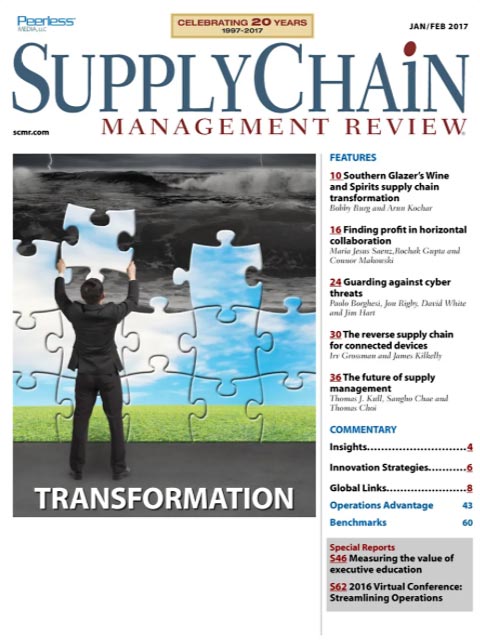Sorry, but your login has failed. Please recheck your login information and resubmit. If your subscription has expired, renew here.
January-February 2017
Transformation is a topic that comes up in almost every conversation I have with supply chain managers these days. Executives from companies as diverse as J&J Vision Care, the division of Johnson & Johnson that manufactures contact lenses, and Thrive Markets, a startup selling health and wellness products to its members, have talked about how they have had to remake their supply chains to meet new customer demands. Transformation is also the theme of this issue of SCMR. Browse this issue archive.Need Help? Contact customer service 847-559-7581 More options
When BSR (Business for Social Responsibility) convened its annual conference in San Francisco in 2015, there was considerable celebration about the landmark agreement at COP21—also known as the Paris Climate Conference. It meant that for the first time in over 21 years of UN negotiations, standards were finally established to achieve a legally binding and universal agreement on climate, with the aim of keeping global warming below 2°C.
When BSR met in New York last November, the cri de Coeur was for “bold climate action,” with analysts observing at the time that multinationals must raise their ambitions by investing in climate finance, transitioning to renewable energy and finding more innovative ways of ensuring resilient supply chains.
It’s challenging to change organizational culture to embrace clean energy and other climate solutions, BSR analysts admit. But they insist that supply chain managers join Corporate Social Responsibility (CSR) managers in becoming “intrapreneurs” charged with persuading a wide variety of stakeholders that climate-focused initiatives are in their best interest.

This complete article is available to subscribers only.
Log in now for full access or start your PLUS+ subscription for instant access.
SC
MR
Sorry, but your login has failed. Please recheck your login information and resubmit. If your subscription has expired, renew here.
January-February 2017
Transformation is a topic that comes up in almost every conversation I have with supply chain managers these days. Executives from companies as diverse as J&J Vision Care, the division of Johnson & Johnson… Browse this issue archive. Access your online digital edition. Download a PDF file of the January-February 2017 issue.When BSR (Business for Social Responsibility) convened its annual conference in San Francisco in 2015, there was considerable celebration about the landmark agreement at COP21—also known as the Paris Climate Conference. It meant that for the first time in over 21 years of UN negotiations, standards were finally established to achieve a legally binding and universal agreement on climate, with the aim of keeping global warming below 2°C.
When BSR met in New York last November, the cri de Coeur was for “bold climate action,” with analysts observing at the time that multinationals must raise their ambitions by investing in climate finance, transitioning to renewable energy and finding more innovative ways of ensuring resilient supply chains.
It's challenging to change organizational culture to embrace clean energy and other climate solutions, BSR analysts admit. But they insist that supply chain managers join Corporate Social Responsibility (CSR) managers in becoming “intrapreneurs” charged with persuading a wide variety of stakeholders that climate-focused initiatives are in their best interest.
 SUBSCRIBERS: Click here to download PDF of the full article.
SUBSCRIBERS: Click here to download PDF of the full article.
SC
MR


Latest Supply Chain News
Latest Podcast

 Explore
Explore
Latest Supply Chain News
- AdventHealth named top healthcare supply chain by Gartner
- Geopolitical readiness in supply chains: Strategic challenges for leaders
- Unlocking retention: The role employee engagement plays
- Can supply chain managers embrace an entrepreneurial mindset?
- Challenges to ESG reporting
- With capacity to spare, logistics real estate demand remains subdued
- More latest news
Latest Resources

Subscribe

Supply Chain Management Review delivers the best industry content.

Editors’ Picks






